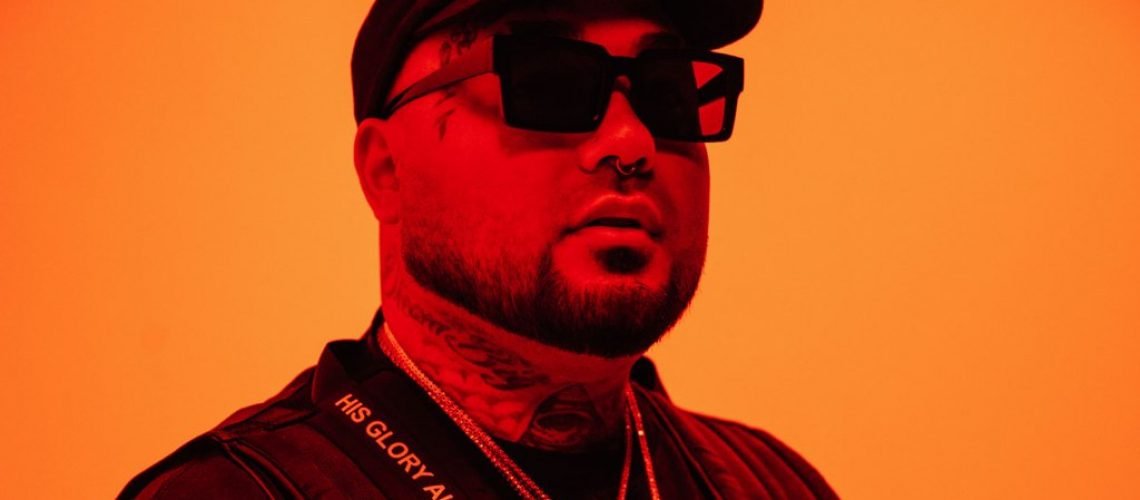Sometimes when Christopher Wilson, who produces and performs bass music as Riot Ten, is out with his family, his four-year old son Kai will have a tantrum. Kai will cry and scream, making a scene in public. But because Kai is non-verbal due to his autism diagnosis, he can’t help Wilson address the issue by saying what’s bothering him, or telling his dad what he needs.
Kai is simply overwhelmed with emotions and anxiety. As a father, Wilson is determined to learn more about how to help his son.
“Honestly, every single time [Kai starts yelling], I feel very proud of myself — because it’s so easy to start yelling at somebody and telling them to stop and to shut up,” Wilson says. “So even when [Kai]’s yelling and screaming and trying to push me away, I’ll go up to him and I’ll hug him and tell him it’s okay.”
A major festival DJ who’s played events like HARD Summer, Imagine Festival, and Lollapalooza, Wilson will tomorrow (April 30) join the lineup of the 14th Annual Run/Walk for Autism in his native El Paso, Texas. He’ll be joined by friends coming from San Diego, Salt Lake City, and Austin, with all of the money they raise going to The Autism Society of El Paso to support people and families affected by autism.
The focus Wilson is applying to the topic is the same that’s brought him success, both as an artist and first as a young father. He first became a dad at 16 upon the birth of his first son, Chris Jr., in 2009. Once Chris Jr. was born, Wilson dropped out of school to pursue music full time. Suddenly, success in his career and success as a father became intertwined. Music is what he wanted to do, and it was also how he was going to support his son.
“I dove straight into it. It wasn’t dabbling,” Wilson says over Zoom from his home in El Paso. “Music was basically my whole life.”
Wilson began teaching himself how to produce while still living with his parents, working odd jobs to bring in some money while also raising his son. Thankfully, both of Chris Jr’s grandmothers were able to help care for him, and after four years of work, Wilson’s first releases as Riot Ten dropped in 2013.
By 2017, he’d signed to imprints including Thrive Music and Dim Mak and was traveling the world, playing festivals like Bass Canyon and EDC China and supporting his son through his artistry.
That same year, when Wilson was 25, his determination was again put to the test when Kai was born prematurely. Wilson’s current girlfriend and Kai’s mother, Alexis Williams, became pregnant with an IUD in place, which the doctor was unable to remove. The IUD eventually punctured the amniotic sac, and after Williams spent two months on bedrest in the hospital, Kai had to be born at only 25 weeks. He was given a 20% chance to live, but made it through despite the slim odds.
Then in late 2021, the now four-year-old Kai was diagnosed with autism. Like 25-30 percent of young children with autism, Kai is non-verbal, but he’s already shown partiality to music, watching the children’s animated series Pocoyo over and over because he loves the songs in it so much.
“It’s kind of weird — I feel like I was almost meant to be the father of Kai, being in my position to be able to provide him with a really good life,” says Wilson. “I think I’ve always been very determined to be above average. To try at least. All you can do is try.”
Below, Wilson talks further with Billboard about his experiences with his four-year-old son, and what he’s learned as a result.
What’s something the average person should know about autism?
I feel like a lot of people get it mistaken that it’s all the same for every kid who’s autistic. Autism is a blanket term for things that kids or adults can be experiencing. Anxiety is a really big one. There are ticks, twitches. Tapping on certain things like OCD. Repeating certain things a lot. It’s a really big range of things that happen, and no two people who are affected by autism are the same at all.
I think another thing that people get confused about is that people with autism tend to be less smart. They’ll call them bad words. Words that mean they’re dumb, and it’s not true at all.
What can people do to support people with autism?
I would say the first thing would be to donate to their local autism foundation. More and more people are affected by autism. I forget what the exact odds are, but the odds are that you know someone who knows someone that has autism. Maybe speak to them, or speak to their parents. Try to become more familiar.
There are a lot of times when I’ll take Kai out and people will give him something like a candy, and they’re expecting a thank you from him and he doesn’t know how to do that — and so they’ll think my son is rude. I’ll tell them he’s on the spectrum, a very common term, and then sometimes people will give — not an ugly look, but an “Oh I’m sorry to hear that.” Other people will be like, “Oh it’s okay, I totally understand.” So if you’re trying to support, get more familiar with autism, and just be nice.
What has it been like to try to be helpful to Kai while not know exactly what he’s experiencing?
It’s a bit frustrating, because you don’t really know exactly what a lot of those feelings are, and you don’t know how to help people who are going through certain things.
I feel like it’s also very rewarding, in a sense of when you can make somebody feel safe or comfortable. Or anytime I educate just one person on it to me it feels very rewarding, because now that person may take that knowledge and when they interact with somebody who has autism, they may make them feel safe and comfortable or happy. Or they might go and educate someone else. It’s kind of like a ripple effect — it has its ups and downs. Pros and cons. Frustrating but also very rewarding.
What strategies have you learned for working with Kai to help him when he’s upset?
It happens often where he’ll have these little meltdowns, where he’ll either be upset about something or he’ll be very uncomfortable in a setting. He’ll be crying, and it looks like he’s throwing a tantrum, but it’s not because he’s spoiled or anything — it’s the anxiety kicking in. He doesn’t know how to express his feelings, so it happens quite often, actually.
Sometimes I’ll throw in a couple tickles; he loves getting tickled. There’s this method with autism called redirecting, where basically you distract them from the issue at hand. A good way to redirect with Kai is you make him laugh and try to just tickle him and pretty fast — actually within five to ten seconds — it’s like he almost forgot why he was upset.
Your first son was born when you were 16, and you immediately started making music to try and support yourself and by extension him. How did that drive affect your career as an artist?
Having a kid that young, I was very determined to succeed. Obviously it’s been a long journey since 16, but when I started back then there weren’t a lot of tutorials on YouTube like there are now. So basically I taught myself everything I know by messing with the program. It strengthened my career to the point where I felt like I had to succeed, and I think it’s worked out decently so far.
How does Kai connect with your music? Is that something you bond over?
What I have noticed is that when I play some of my songs, he gets upset. I’ll do the car test, and I don’t have it too loud, but I’ve noticed there are some songs I play of mine that are a little bit more aggressive, and he’ll start to complain. I’ll look back and I’ll say, “You don’t like it?” So I’ll change it to the radio and he’ll quiet down and he’s fine. It’s like, “OK, cool, you didn’t like this one.” So he more so disagrees with it rather than agrees with it.
Either way I’m sure it’s a very heartening experience for you to see that reaction.
Yeah, my music’s not for everybody! [Laughs.]




